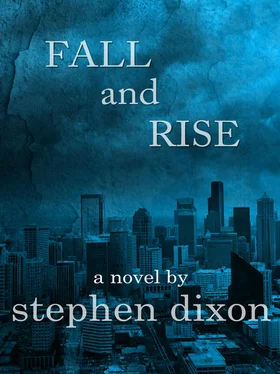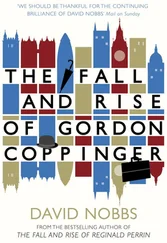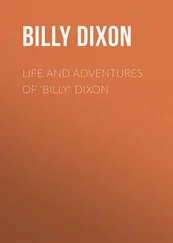Stephen Dixon - Fall and Rise
Здесь есть возможность читать онлайн «Stephen Dixon - Fall and Rise» весь текст электронной книги совершенно бесплатно (целиком полную версию без сокращений). В некоторых случаях можно слушать аудио, скачать через торрент в формате fb2 и присутствует краткое содержание. Год выпуска: 2013, Издательство: Dzanc Books, Жанр: Современная проза, на английском языке. Описание произведения, (предисловие) а так же отзывы посетителей доступны на портале библиотеки ЛибКат.
- Название:Fall and Rise
- Автор:
- Издательство:Dzanc Books
- Жанр:
- Год:2013
- ISBN:нет данных
- Рейтинг книги:5 / 5. Голосов: 1
-
Избранное:Добавить в избранное
- Отзывы:
-
Ваша оценка:
- 100
- 1
- 2
- 3
- 4
- 5
Fall and Rise: краткое содержание, описание и аннотация
Предлагаем к чтению аннотацию, описание, краткое содержание или предисловие (зависит от того, что написал сам автор книги «Fall and Rise»). Если вы не нашли необходимую информацию о книге — напишите в комментариях, мы постараемся отыскать её.
Fall and Rise — читать онлайн бесплатно полную книгу (весь текст) целиком
Ниже представлен текст книги, разбитый по страницам. Система сохранения места последней прочитанной страницы, позволяет с удобством читать онлайн бесплатно книгу «Fall and Rise», без необходимости каждый раз заново искать на чём Вы остановились. Поставьте закладку, и сможете в любой момент перейти на страницу, на которой закончили чтение.
Интервал:
Закладка:
“That’s very generous, but it seems — what is this word, ‘Brooklyn’?—a little out of my way.”
“If you need a ride, we’ve the Bible bus. Door to door, no fare and always a seat and a very congenial group of passengers aboard and nothing required inside the center but decorum.”
“Thanks again. I’ll think about it, really. Goodnight.” I put the pamphlet into my coat pocket and pull out of the same pocket the notebook and from my pants my pen. It’s just, well, more accurate vernacular and suitable for that section of his poem: “That’s true that the universe or burst goes slow while we trump and rump along so fast, but aren’t we all or almost trying to make up or do for our own undivined lust time? Oh Hasenai, paltry maker of mephitic fishy poems when you would rather be or could like your dada or older breaders who trained you a rather rich unsolipsistic baker of fish-filled bisquits and pungent buns, crucify those last lines,” though I don’t know about the additional rhymed links or any of them in that linkage of lines. Not in the original for sure. Change it. Keep it. Rearrange it. “Thanks you very much,” the woman says to another man she stopped when he let the pamphlet she gave him fall out of his hand, and she picks it up, blows on it and goes. Just think about it then but jot it down now so you don’t forget and send Jun an aerogram asking if all these liberties with his work will be all right. But he’s already said in a recent Christmas card something like “Do your damndest bestest, Misty Dan, and then some and once more again my favoritest friend who isn’t a fabulist or Japanese, and then any way you sayest dost goes, even to the deez and doze. Hey, I play with your linguini also but not too well, so what about that Joe? And here convey big season’s greetings much too early I know, but Christmas has become a temporal event in Japan also and the post lines in the ensuing weeks are the one lines I want to avoid.”
I write in the notebook “That’s so for that’s true in Last One in is Out, Jun the Souring Shout — Let’s Croak, antepen stanz, and call mom, see and be with her too, and don’t just says, damn yous, dooz!”
Sirens — police, fire or ambulance — heading my way though not necessarily to the crash. I look, still nothing, stop at a florist’s a half-block up I always seem to stop at down here for its original window displays on seasonal or topical themes. This one has a row of Pilgrim’s buckled shoes on the floor with flowers and earth in them and ceiling track-lights highlighting each one. The quick slide changes behind it, from a projector I can’t see but believe is behind the screen, are of the various stages of a turkey: from two mating, to the birth of one, I close my eyes to the slides of a headless turkey running around, to one roasted and dressed on a festive table. Most of the shoe flowers I’ve seen but can’t name though once made an effort to. Exotic, must be from more Southern states at this time — perhaps the florist’s birthplace — or else I don’t get the point. Obsequial? Delphiniums: think that’s them. In the next shoe some sort of orchid: lady’s nose, girlie’s big toe, something close. Someone once started to teach me about them and trees and birds and their songs and leaves, but who? Yes, effort, once did, forgot or got stopped by that old chainsmoking translator what was his name, died of a long-windedly named kidney disease a month ago. Saw the obit and photo. Two columns and a sampler and appreciation of his work and list of the many writers he’d translated and often almost recomposed. Always a relatively poor and brusque though noble and articulate polyhistoric fellow. Loved Iceland for its cheap airfares, migratory birds and heroic prose. His name though. Shvern? Slappern? Slade? Once heard him read at the Y and nearly had to leave because it was in that last-leg delivery so many poets seem to favor when his real voice, when it wasn’t raucous before or after an outpour of cigarette coughs, was sonorous and strong. Like something unguent oozing through, but I was never adept at similes or even much esteemed their use. “A good simile,” Hasenai says in his poem “Look Alike,” which if I don’t find one weaker will be the weakest of all the poems I choose, “is like a computer readout compared to an acceptance letter, meaning rhyme and poetry are better and like acceptance letters can’t be written on a word-processing machine, or so it seems to me.” Deep forehead crease he once in an unusually puckish mood hid a toothpick in or two, but how’s it possible I forgot his of all translators’ names? Snipper, Switter, Stade? Drove a red Rambler I remember with its fenders held together by picture-framing wire and with no reverse or door handles outside or in. “Jump over,” he’d say when he drove us to our walks, or open the door on my side with a screwdriver and I’d sit on what looked like hay. Invariably cigarette ashes on his lap, vest and sleeves, which is such a characteristic cliché, and which he never — and this too — seemed to notice or whisk away, so they’d just float off or fall. And gaunt, worn, tall, with thick rich brown hair, which several people said he dyed, but he was never vain in that way, and close-cropped, and never in need of a shave. “I look like a toy goy in a boy’s play convertible,” he said, “but I doubt they ever fabricated one with a ravaged backseat replete with Flemish newspapers, Praenestine glossary, field guides, Audubon postcards and Low Franconian journals.” And tweeds. Even at breakfast at the colony I met Diana at several years later and where I started to accompany him on what he called his “quotedium post-scrambled egg and prune juice promenade.” And a tie. Rumpled, same one, college stripes and soup spots, shirt collars he ironed without removing the stays. Must remember to attend his memorial service at Columbia next week. Heard that many of the serious East Coast translators will be there instead of anything resembling a family. Lived alone, in a two-room Bronx apartment over a Syrian bakery which before that made bialys and before that Irish sodabread, “which tells you how long I’ve lived there and what rent I pay, place always toasty, except on the respective Sabbaths, even when it was a cold-water flat.” Because he refused to teach, which almost he alone of us got offers to, saying he was as driven to translate poetry as his poets were in delaying to create them, no students at the service except maybe a few who might have read him and venerated his dedication and work. A number of those other translators are what’s been discouraging me from going though I’ll go, but not to talk about possible literature positions anyone might know of at some not-too-distant school and the latest translating grants and awards which Switch, it is, Simon Oliver Stritch, in fact, often got, though far as I know never went to memorials, literary functions and parties to make contacts and get references and inside dope, but what is it I started out to say? Right. Stritch urged me to hold off any but the most utilitarian interest in fauna and flora till I got to around his age and had nothing better to do with my nontranslating time than take trips to bird and seal sanctuaries and go on long art colony nature-walks. He even, after a while, wouldn’t let me accompany him on one and also checked out every colony library book on the subjects, so much did he want me to finish a large body of work before I was forty when he said most promising translators get restless and tired and need to get permanent addresses and partners and, because of their sinking incomes and no eventual pensions, comparatively easy tenure-track teaching jobs. “Send me your next book,” he said when I last saw him, which I did and then another copy care of his publisher, but he never acknowledged receipt. On both I wrote my inscription for that time: “From the poets and me or I,” and added a lie: “To the contemporary master of us all,” hoping he wouldn’t see through the compliment and that he’d write back he essentially liked my translation and would do what he could to get it reviewed and in the future boost my work and grant chances and maybe even help me get a university appointment or let me know of an opening of one, but why couldn’t I remember his name? Shame maybe, that I also thought to use him. More likely some different kind of slip, one with lots of answerable or to some people logical problematical possibilities predicated on something I don’t quite understand now though as far as I’m concerned — But what do I mean by logical possibilities, if I didn’t mean probabilities, or even answerable or problematical or possible or predicational ones? And how can I defend “different kind of slip” when I know damn well when it comes down to it — What I mean is that when I get to the deepest truth of it or something like that the possibility can’t be, what? Just drop this or go back a bit. Shame. That I forgot his name. Simon Oliver something or another — oh shit, can’t believe it — spit, slip, snit, shift, Stritch.
Читать дальшеИнтервал:
Закладка:
Похожие книги на «Fall and Rise»
Представляем Вашему вниманию похожие книги на «Fall and Rise» списком для выбора. Мы отобрали схожую по названию и смыслу литературу в надежде предоставить читателям больше вариантов отыскать новые, интересные, ещё непрочитанные произведения.
Обсуждение, отзывы о книге «Fall and Rise» и просто собственные мнения читателей. Оставьте ваши комментарии, напишите, что Вы думаете о произведении, его смысле или главных героях. Укажите что конкретно понравилось, а что нет, и почему Вы так считаете.












